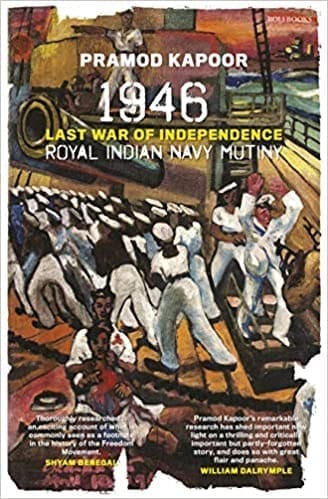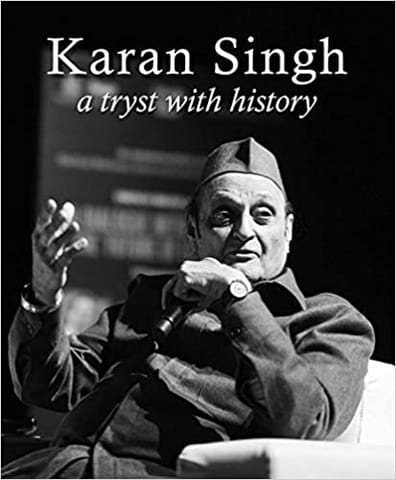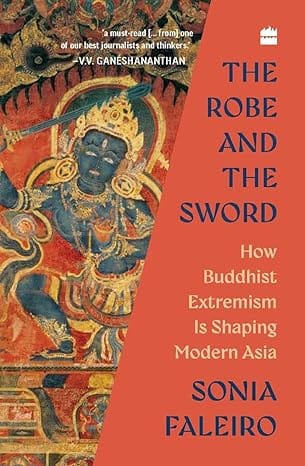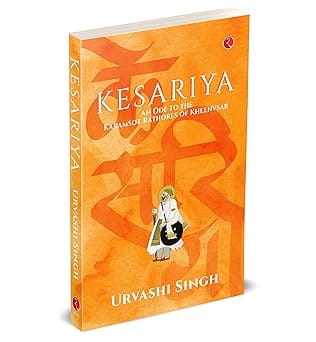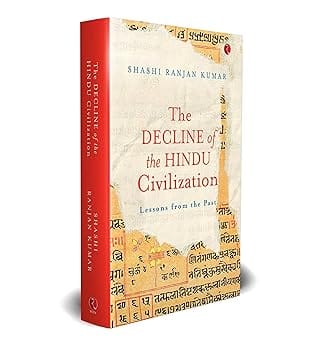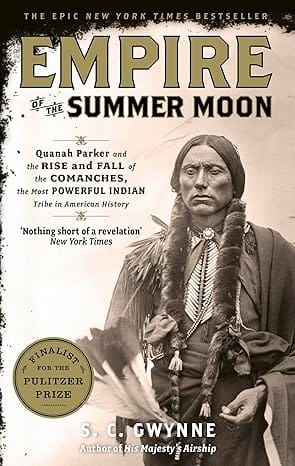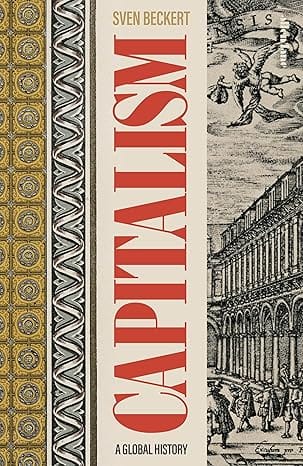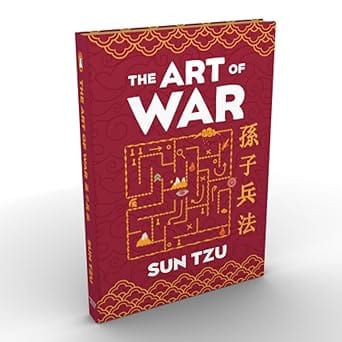- Non-ficton
- Non-ficton
- Contemporary Fiction
- Contemporary Fiction
- Children
- Children
- Comics & Graphic Novels
- Comics & Graphic Novels
- Non-Fiction
- Non-Fiction
- Fiction
- Fiction
In 1946, 20,000 non-commissioned sailors of the Royal Indian Navy mutinied. They were inspired by the heroism of the Azad Hind Fauj. But their anger was sparked by terrible service conditions, racism, and broken recruitment promises. In less than 48 hours, 20,000 men took over 78 ships and 21 shore establishments and replaced British flags with the entwined flags of the Congress, the Muslim League, and the communists.
The British panicked and announced a Cabinet Mission to discuss modalities of transfer of power. By this time, Indian troops had refused to fire on the ratings, and the mutiny sparked revolts in other branches of the armed forces. The young ratings presented a charter of demands, even as they fought pitched battles against British troops. People thronged the streets in support, and hartals were followed by street fights between civilians and British soldiers resulting in over 400 deaths and 1,500 injured.
To quell the rebellion, British commanded their powerful warship HMS Glasgow to sail rapidly from Trincomalee and ordered low sorties by the Royal Air Force fighter planes. In retaliation, the ratings trained the guns mounted on the captured ships towards the shore, threatening to blow Gateway of India, Yacht Club, and the dockyards.
As violence escalated, telegrams flew between the Viceroy’s office and the British Cabinet. The British realized they could no longer hold India by force. While the communists continued to support the rebellious ratings, the Congress and the Muslim League persuaded them to surrender, promising they would not be victimized. Shamefully, years later, the governments of India and Pakistan refused to honour those promises after Independence.
The mutiny caused public disagreements between Gandhiji and Aruna Asaf Ali, and between Sardar Patel and Nehru. Historians say it accelerated the transfer of power. But this seminal event, which inspired songs, art and theatre has been edited out of the popular narratives of the Freedom Movement.
Review
‘Thoroughly researched... an exciting account of what is commonly seen as a footnote in the history of theFreedom Movement.’- Shyam Benegal
‘We should be beholden to Pramod Kapoor for telling the story from the perspective of the humble “ratings” who fought their battle, abandoned by some of our best-known freedom fighters who, like hardboiled politicians ready to take on the responsibility of ruling India, were unwilling to stall the transfer of power. This book is a challenge to us to take a second look at our revered political figures whose charismatic public presence often hid their insecure ruthlessness and narcissism, both leavenedwith a touch of hypocrisy.’- Dr. Ashis Nandy
‘This book is a major achievement based on incredible research. A must read for anyone interested in the history of twentieth-century India and how common people made that history.’- Rudrangshu Mukherjee
‘Pramod set out to unearth a forgotten and ignored chapters in our nationalist history and what an excellent job he has done... This is a document that fills a vital gap in our history.’- Sidharth Bhatia
About the Author
In 2016, he was conferred with the prestigious Chevalier de la Legion d’Honneur (Knight of the Legion of Honour), the highest civil and military award in France, for his contribution towards producing books that have changed the landscape of Indian publishing. He is also a recipient of the prestigious Mahatma Award 2021 (an Aditya Birla Group initiative) for Lifetime Achievement for his contribution to publishing and literature in India.
This book is a result of his years of research and deep interest in the period and personalities who have left a mark in the subcontinent’s history.
1946 Royal Indian Navy Mutiny: Last War of Independence
SIZE GUIDE
- Author: Pramod Kapoor
- Format: Hardbound
- Publisher: Roli Books
- Pages: 376
- Edition: Author Signed Books
Book Description
In 1946, 20,000 non-commissioned sailors of the Royal Indian Navy mutinied. They were inspired by the heroism of the Azad Hind Fauj. But their anger was sparked by terrible service conditions, racism, and broken recruitment promises. In less than 48 hours, 20,000 men took over 78 ships and 21 shore establishments and replaced British flags with the entwined flags of the Congress, the Muslim League, and the communists.
The British panicked and announced a Cabinet Mission to discuss modalities of transfer of power. By this time, Indian troops had refused to fire on the ratings, and the mutiny sparked revolts in other branches of the armed forces. The young ratings presented a charter of demands, even as they fought pitched battles against British troops. People thronged the streets in support, and hartals were followed by street fights between civilians and British soldiers resulting in over 400 deaths and 1,500 injured.
To quell the rebellion, British commanded their powerful warship HMS Glasgow to sail rapidly from Trincomalee and ordered low sorties by the Royal Air Force fighter planes. In retaliation, the ratings trained the guns mounted on the captured ships towards the shore, threatening to blow Gateway of India, Yacht Club, and the dockyards.
As violence escalated, telegrams flew between the Viceroy’s office and the British Cabinet. The British realized they could no longer hold India by force. While the communists continued to support the rebellious ratings, the Congress and the Muslim League persuaded them to surrender, promising they would not be victimized. Shamefully, years later, the governments of India and Pakistan refused to honour those promises after Independence.
The mutiny caused public disagreements between Gandhiji and Aruna Asaf Ali, and between Sardar Patel and Nehru. Historians say it accelerated the transfer of power. But this seminal event, which inspired songs, art and theatre has been edited out of the popular narratives of the Freedom Movement.
Review
‘Thoroughly researched... an exciting account of what is commonly seen as a footnote in the history of theFreedom Movement.’- Shyam Benegal
‘We should be beholden to Pramod Kapoor for telling the story from the perspective of the humble “ratings” who fought their battle, abandoned by some of our best-known freedom fighters who, like hardboiled politicians ready to take on the responsibility of ruling India, were unwilling to stall the transfer of power. This book is a challenge to us to take a second look at our revered political figures whose charismatic public presence often hid their insecure ruthlessness and narcissism, both leavenedwith a touch of hypocrisy.’- Dr. Ashis Nandy
‘This book is a major achievement based on incredible research. A must read for anyone interested in the history of twentieth-century India and how common people made that history.’- Rudrangshu Mukherjee
‘Pramod set out to unearth a forgotten and ignored chapters in our nationalist history and what an excellent job he has done... This is a document that fills a vital gap in our history.’- Sidharth Bhatia
About the Author
In 2016, he was conferred with the prestigious Chevalier de la Legion d’Honneur (Knight of the Legion of Honour), the highest civil and military award in France, for his contribution towards producing books that have changed the landscape of Indian publishing. He is also a recipient of the prestigious Mahatma Award 2021 (an Aditya Birla Group initiative) for Lifetime Achievement for his contribution to publishing and literature in India.
This book is a result of his years of research and deep interest in the period and personalities who have left a mark in the subcontinent’s history.
User reviews
NEWSLETTER
Subscribe to get Email Updates!
Thanks for subscribing.
Your response has been recorded.

India's Iconic & Independent Book Store offering a vast selection of books across a variety of genres Since 1978.
"We Believe In The Power of Books" Our mission is to make books accessible to everyone, and to cultivate a culture of reading and learning. We strive to provide a wide range of books, from classic literature, sci-fi and fantasy, to graphic novels, biographies and self-help books, so that everyone can find something to read.
Whether you’re looking for your next great read, a gift for someone special, or just browsing, Midland is here to make your book-buying experience easy and enjoyable.
We are shipping pan India and across the world.
For Bulk Order / Corporate Gifting
 +91 9818282497 |
+91 9818282497 |  [email protected]
[email protected]
Click To Know More
INFORMATION
QUICK LINKS
ADDRESS
Shop No.20, Aurobindo Palace Market, Near Church, New Delhi

